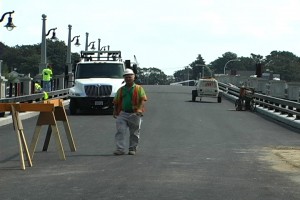 Delays in the construction of the Barrington Bridge were the most public display of bad blood between the Rhode Island Department of Transportation and the contractor for the project, Shire Corporation of Cranston.
Delays in the construction of the Barrington Bridge were the most public display of bad blood between the Rhode Island Department of Transportation and the contractor for the project, Shire Corporation of Cranston.
But that was only the tip of the iceberg, according to a lawsuit Shire filed against the state in 2009. The suit claimed the DOT had an ongoing vendetta against Shire and made a concerted effort to freeze the company out of future state projects, including a bid to replace the Union Avenue Bridge back in 2005.
The lawsuit, in its fourth year, already cost taxpayers at least $1.5 million in legal fees. So late last year, the state quietly settled, shelling out another $2 million in taxpayers’ dollars to make it all go away. When The Hummel Report inquired about it more than a year ago, the DOT’s Michael Lewis declined to talk about the suit, the roots of which began long before he became director.
He recently answered our questions, including: why the settlement?
“In any kind of litigation there’s risk,” Lewis told us. “We think the risk was low, but the Department of Administration and the Department of Transportation legal offices determined that it was in the state’s best interests to settle that out for the value that it was, and put that chapter behind the state.”
For the better part of a decade, Shire Corporation was the public punching bag for problems on the Barrington Bridge project, as higher-ups in the DOT blamed the contractor for delays and cost overruns.
But we learned last year that a Department of Administration official, called in to referee, put the blame for delays squarely in the DOT’s lap and ordered it to pay Shire $5.3 million in taxpayer money. The DOT did not admit liability, and Shire’s president, Tom Gammino, in an interview last year with The Hummel Report, said the order angered some of the higher-ups in the DOT, prompting them to go on the warpath against Shire, which regularly bid on large state construction projects.
The heart of the 2009 lawsuit filed against the DOT and eight people in their state positions says the state delayed awarding the Union Avenue project to Shire because of the ongoing dispute between the DOT and the company, even though Shire was the low bidder.
Hummel: It’s taxpayer money and when you’re crying poverty, then to have to pay a $2 million judgment, what do you say to the taxpayer about that?
Lewis: It was a settlement position that was in the best economic interests of the state. To stop paying legal fees, to remove any risk of any settlement adverse to the state. A decision was made; there were a lot of people involved.
Hummel: No admission of responsibility in the suit, though?
Lewis: No, no.
Hummel: So it’s $2 million to make this go away?
Lewis: Again, there is risk in any lawsuit and that was a judgment that was made by a number of people involved in the state to make that determination that it was the right thing to do.
Hummel: When somebody files a suit, if it’s absolutely a frivolous suit with no merit at all, your lawyers are going to go in there and a judge…you’re going to make a motion to have it dismissed based on a false set of facts or it’s not holding up. So to me, the fact that it moves forward, a judge says it moves forward and you ultimately decide to settle shows, whether you want to admit it or not, some type of liability or admission by the state. You know what? Maybe we did do it wrong. Do you not agree with that assessment?
Lewis: There were a lot of parties involved. We did go for summary judgment on the case and the judge ruled in our favor in eight out of the 10 counts on summary judgment. There was an appeal to that. We are going to continue to pay legal fees and these can become very high.
What Lewis didn’t say is that the remaining two counts were the heart of the case involving the Union Avenue Bridge, and an allegation the state and the Federal Highway Administration worked together to keep Shire from getting what eventually turned out to be an $8 million job, which was awarded to Aetna Bridge of Pawtucket.
When you add up the Barrington Bridge project and the costs associated with the lawsuit and settlement, taxpayers have ponied up nearly $10 million for the state’s disputes with Shire.
But no admission by the state in the Shire suit of liability.
Hummel: Any discipline, any change of position, anybody lose their job, anybody lose a paycheck?’
Lewis: Jim, this is not what this interview was about. I go back and look at that at those issues. A lot of people who were involved in the work, including the Barrington Bridge, that led up to this lawsuit are no longer employed in the Department of Transportation.
But Lewis would not elaborate and insiders, both at the DOT and within the construction industry, tell The Hummel Report that many key people who had their fingerprints on the Shire debacle remain.
The Hummel Report is a 501 3C non-profit organization. If you have a story idea or want make a donation to the Hummel Report, go to www.hummelreport.com. Or mail Jim directly at jim@hummelreport.com.